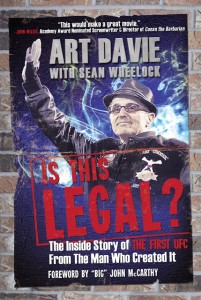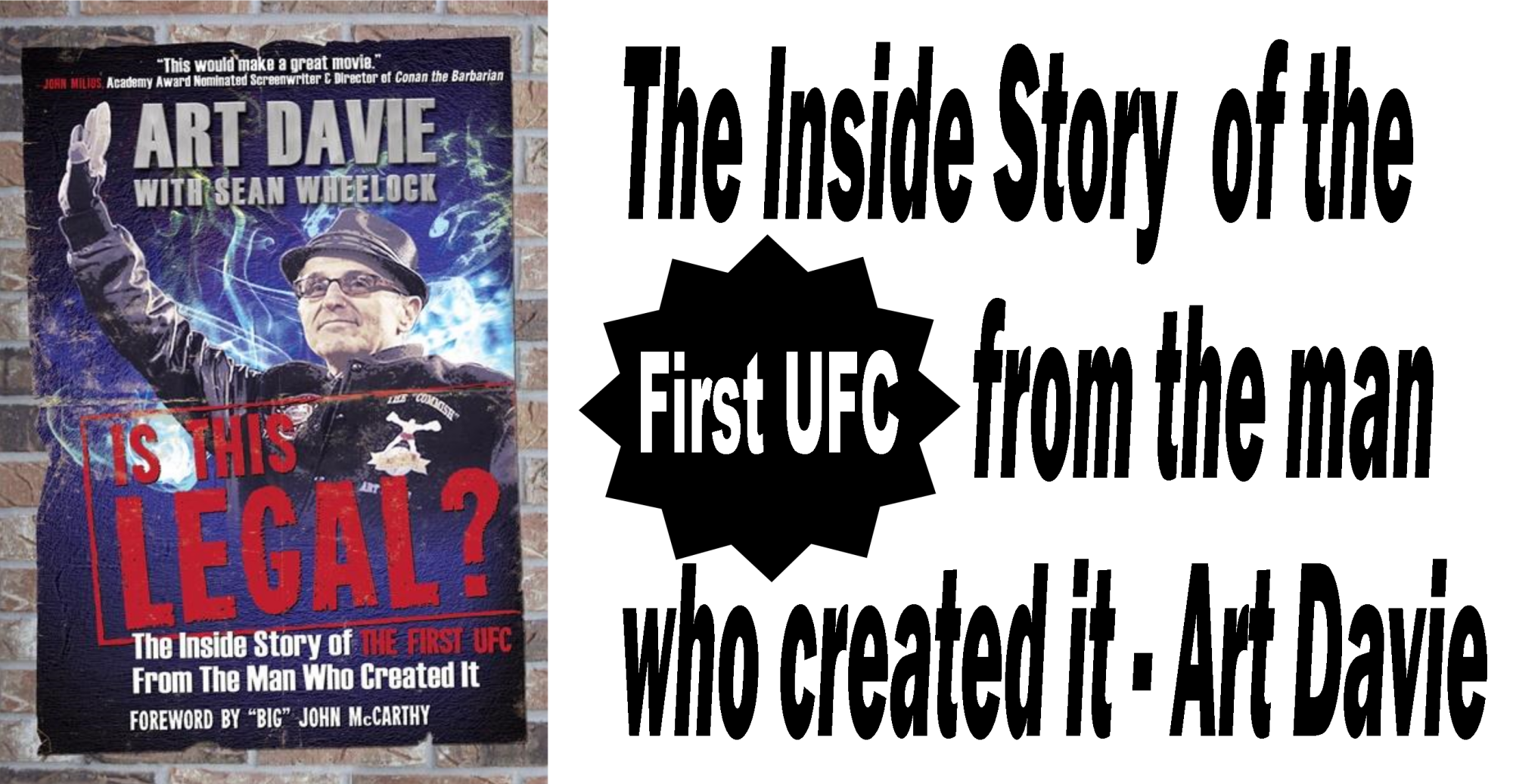 IS THIS LEGAL?
IS THIS LEGAL?
THE INSIDE STORY OF THE FIRST UFC
FROM THE MAN WHO CREATED IT
July 1, 2014 — On November 12, 1993, in Denver, Colorado, the Ultimate Fighting Championship (UFC) unleashed an explosion of blood – both figuratively and literally – as 6’5” Dutch kickboxer Gerard Gordeau smashed 420 lb. sumo wrestler Teila Tuli flush in the face, less than 30 seconds into the night’s opening fight. The kick sent one of Tuli’s teeth flying into the crowd, instantly establishing that, as one of the commentators said that night, “fighting is not what we thought it was.”
The UFC’s launch came with virtually no warning or fanfare. Yet nearly 90,000 households ordered and watched the event on pay-per-view television. This style-versus-style martial arts tournament was the creation of Art Davie, an ad man and serial entrepreneur who first conjured the idea four years prior.
Now, for the first time, the true story about the creation of mixed martial arts and the inaugural UFC is told by the man who started it all in his behind-the-scenes, tell-all book, IS THIS LEGAL? Equal parts Abner Doubleday, PT Barnum, and Dr. James Naismith, Davie explains how he turned his vision, of a single-night tournament involving the greatest martial arts fighters, into the first UFC, which now stands as an international billion-dollar sports franchise.
IS THIS LEGAL? is a vivid and fast-moving first-person account exploring Davie’s adventures navigating through a world of financial risks, political power-plays, egotistical fighters, family feuds, and numerous powder-keg situations – all to answer the age-old question of who is the world’s best fighter?
Written with noted MMA television play-by-play commentator Sean Wheelock (with the foreword by legendary MMA referee ‘Big’ John McCarthy), Is This Legal? is not just for fight fans, but also for anybody who appreciates the tale of a maverick who’ll stop at nothing to fulfill his vision and achieve his dreams.
Is This Legal? also features a highly improbable cast of characters, including Academy Award nominee John Milius, NFL Hall of Fame running back Jim Brown, action film star Chuck Norris, kickboxing champ Benny ‘The Jet’ Urquidez, Brazilian jiu-jitsu legend Rorion Gracie and pay-per-view TV pioneer Bob Meyrowitz.
With the creation of the UFC, Art Davie started a revolution in the world of martial arts. And this revolution was televised.
Advance Praise For Is this Legal?
Randy Couture
UFC Hall of Famer & Former UFC Heavyweight and Light Heavyweight Champion
Is This Legal? is an honest, shocking, enthralling and nostalgic look back at the creation of the modern age of mixed martial arts in the United States. This is all the real stuff that no one gets to see or hear about, when the newest combative sport of MMA was forged, and Art Davie was one of its founding fathers! Thanks goes out to Art for persevering, and giving all professional martial artists a place to ply our wares and test our skills.
John Milius
Director of Conan The Barbarian & Academy Award Nominated Screenwriter
This would make a great movie.
Frank Shamrock
First-Ever UFC Middleweight Champion
The first Ultimate Fighting Championship reset the martial arts culture in the U.S., and created a brand-new American sport that’s now become a global phenomenon. Art Davie’s vision of blending combat sports and entertainment inspired a pay-per-view and martial arts generation, while creating new careers for combat sports athletes.
Excerpts From Is This Legal?
On the first Ultimate Fighting Championship’s “Creative Director”—Academy Award Nominated Screenwriter John Milius:
Milius invited us to his office at Sony Pictures Studios in Culver City. In addition to filling in Milius on SEG and our capital raise, we wanted to discuss the fighting area for the event with him. After all, as the director of Conan the Barbarian, Milius had Arnold Schwarzenegger fighting in a pit—imagery that I absolutely loved. His time was always tight, so I knew that we had to get every idea that he had. Right away, I accepted a Montecristo from Milius, and as our meeting progressed, he would go to the door and blow smoke down the hallway.
“I like to piss off the Disney pukes,” he explained, which made me laugh.
Milius thought that perhaps the gladiatorial approach would be the ticket. He told us that we should have cheerleaders, but that we’d call them the “vestal virgins.” He also thought that we should get a mascot, something like the USC Trojan. As Milius was cranking into high gear, the phone rang. Julie Ann, Milius’ secretary, answered it, then came in and announced, “Moses is on the phone.” Charlton Heston wanted to talk about some National Rifle Association business.
As much as I liked Milius before that meeting, I liked him even more after it. In the land of Hollywood cool, he was the coolest.
On the rules meeting that almost ruined the first Ultimate Fighting Championship:
At this point, Rorion and I had completely lost control of the meeting. The fighters and their camps were all loudly arguing, and I could see that this whole f—— event was coming apart before it had even started.
Everyone, with the lone exception of Gerard Gordeau, was going crazy, and Rorion was completely swallowed by the moment.
It then hit me like a full on punch to the face that I’d made a terrible miscalculation. From the fighters’ perspective it was bad enough that Rorion was one of the people in charge of the Ultimate Fighting Championship, but now he was also the rules director of an obviously made-up sanctioning body. The fighters couldn’t help but ask how Rorion could possibly be impartial when his brother was in the tournament, representing the style of fighting created by his father and uncle? I was the one who personally wrote the rules—not Rorion—but he was the one standing in the front of the room, listing and defending them.
Then Teila Tuli, in the most dramatic and theatrical of gestures, stood up and announced, “I just signed my paper. I don’t know about you guys, but I came here to party. If anyone else came here to party, I’ll see you tomorrow night at the arena.” He then slammed his signed paper down on the table. The sound reverberated throughout the room.
With that, it became eerily quiet. And then the Gracie brothers started applauding. Then Trent Jenkins started applauding. And within seconds, everyone, apart from Frazier, was applauding.
On the pre-fight breakdown of Royce Gracie:
“Art, you’re not going to believe what I just saw,” he said. “Royce absolutely lost it after rehearsal.”
Todd went on to tell me that after everyone had cleared out, he saw Royce and Rickson walk back into our fighting area. They knelt on the mat facing each other, and Royce just started crying inconsolably. Rickson then tightly embraced his brother, the way a father holds his sobbing child who has just awoken from a terrible nightmare.
What Todd had to say actually didn’t surprise me at all. The crushing pressure of the moment was squarely on the shoulders of Royce, and I seriously doubted that he’d asked for any of this. Without question, this wasn’t about him, it was about his dad, his brothers, his uncle—the entire Gracie name and legacy. At that point, I truly believed that my partner Rorion should have made amends with his brother Rickson, because this was going to be far too much for poor, sweet Royce to bare.
On the final contract negotiations with Pay Per View partner SEG and President Bob Meyrowitz:
Immediately, I could tell that Meyrowitz was wired, but was trying his hardest to remain calm. He clearly didn’t want to piss me off, but acting like this was against his nature, and I thought it must be killing him.
“I’m good with everything else Bob, but SEG is going to have to pay all fighter purses after tonight. That’s prize money and guarantees. It’s just part of talent costs. And fighters are the talent for this show.”
The call dragged on and on, extending past the hour mark. We kept going over this issue, with SEG offering to pay varying percentages of the fight purse, none totaling the 100% that I demanded. Either Meyrowitz was going to blink first, or I was. This was about the future of the Ultimate Fighting Championship, but without tonight, there would be nothing.
“OK, Art. You win. Are you happy? I hope you’re f—— happy!”
The contract was faxed to my hotel room, and I signed it at 5:47 p.m.—seventy-three minutes before our on-air time.
I was right on the verge of caving in, but Meyrowitz lost his nerve and caved first. There was no time to celebrate though, as I had to get my ass back to McNichols Arena, and watch my dream now finally become a reality. But then I decided that there was time for one more glass of scotch.
On the Gerard Gordeau vs. Kevin Rosier fight in the first Ultimate Fighting Championship:
The Dutchman then went in for the kill, and landed a huge right hand that dropped Rosier against the base of the fence. Gordeau then proceeded to pummel Rosier, who kept trying to get up, only to be literally beaten back down by his opponent.
Sensing the end of the fight, Gordeau delivered a vicious elbow to the head, and then a stomp to Rosier’s ample gut. Rosier rose up and tapped the mat in submission, which the referee Hélio Vigio missed completely. Gordeau did see the tap, and mercifully walked away from his devastated opponent. The towel was thrown in a few seconds later, which was spotted by the referee.
Gordeau had followed his twenty-six second squash of Teila Tuli with a 59-second beat down of Rosier, which earned him a place in the final.
I felt certain that Gordeau had engaged in tougher battles on the streets of Amsterdam against unruly brothel and hash bar owners who were late on their debt payments. In two fights, he had thrashed a pair of men who weighed in at a combined 740 plus pounds, and he hadn’t even been hit.
I said out loud, to no one in particular, “F— who’s going to beat this guy?”
Visit www.ascendbooks.com for more great titles on your favorite teams, coaches, athletes, and celebrities.
Posted 6-14-14
